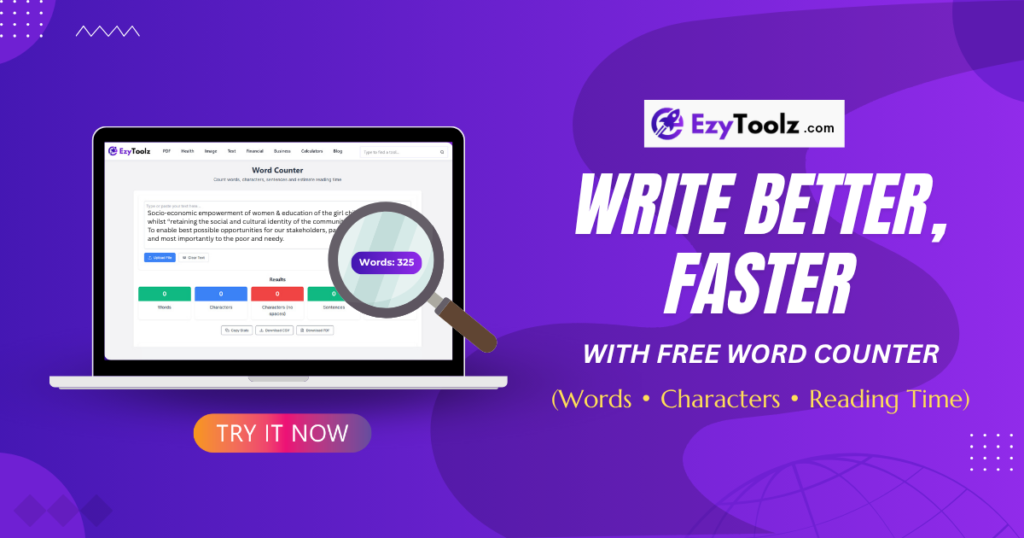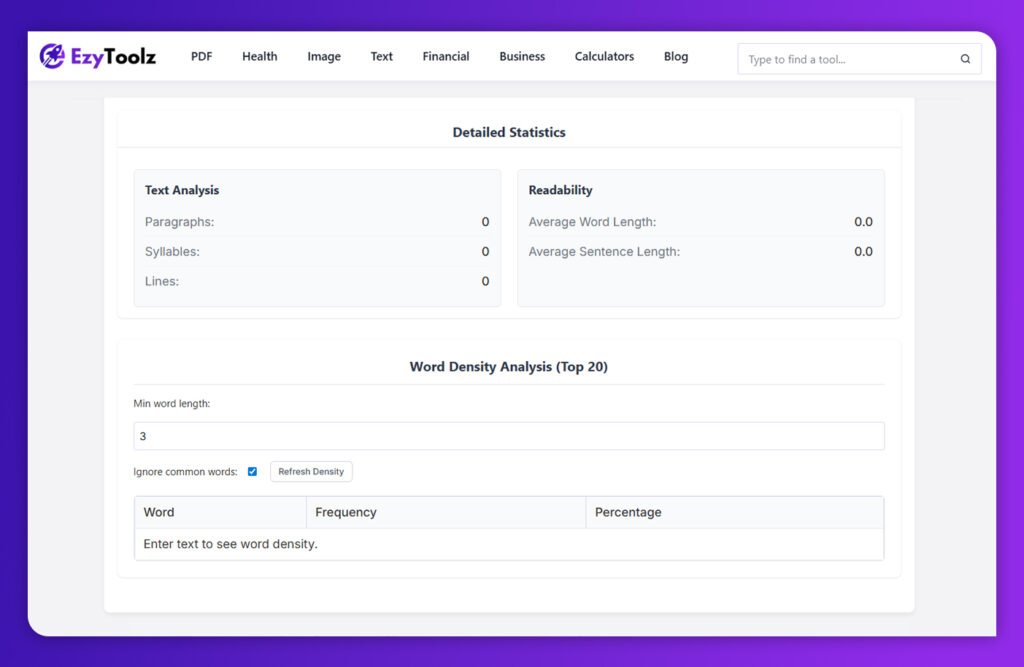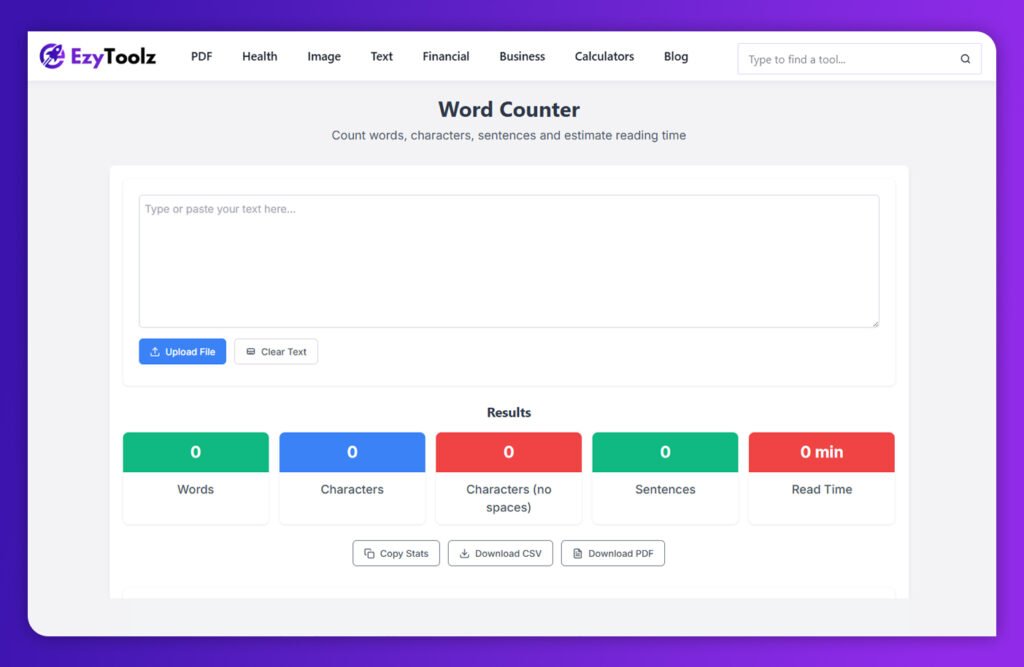
What is a Word Counter Tool & Why Every Writer Should Use It
In the world of writing, words are our currency. Whether you’re a student striving to meet the 2,000-word limit on an essay, a blogger crafting the perfect SEO-friendly article, or a novelist chipping away at a manuscript, one thing is constant: every word matters. But beyond just the final count, understanding the structure, density, and readability of your text is what separates good writing from great writing. This is where a powerful digital assistant becomes indispensable.
Many writers rely on the basic counters built into their word processors, but these often only scratch the surface. What if you could get a deep, insightful analysis of your text in seconds, without installing any software? What if you could instantly know the reading time of your article, check your keyword density for SEO, or even count the words in a PDF or DOCX file with a single click?
This guide will explore the world of the modern online word counter tool. We’ll delve into what it is, who it’s for, and why it has become an essential part of every successful writer’s toolkit. Get ready to discover how this simple yet powerful utility can refine your writing, boost your productivity, and help you meet your goals with precision and confidence.
Table of Contents
What is a Word Counter Tool?
At its core, a Word Counter tool is a utility that calculates the total number of words in a piece of text. However, a modern, high-quality word counter does so much more. It’s not just a calculator; it’s an analytical dashboard for your writing.
Think of it as a fitness tracker for your text. A basic tracker might only count your steps, but an advanced one tells you about your heart rate, sleep patterns, and calories burned, giving you a complete picture of your health. Similarly, an advanced online word counter tool provides a holistic view of your content.
Beyond just the word count, it provides crucial metrics like:
- Character Count: Essential for platforms with strict character limits, like Twitter (now X), or for crafting perfect SEO meta titles and descriptions. It typically shows the count both with and without spaces.
- Sentence and Paragraph Count: Helps you analyze the structure of your writing. Are your sentences too long? Are your paragraphs too dense? This data helps you improve flow and readability.
- Reading Time Estimation: Calculates how long it will take an average person to read your text, a vital metric for keeping online readers engaged.
- Readability Analysis: Provides data like average word length and average sentence length, which are key indicators of how easy your text is to understand.
- Word Density: Shows you which words and phrases you’re using most frequently. This is incredibly powerful for academic writing (to avoid repetition) and for SEO (to ensure you’re targeting the right keywords).
A truly versatile online word count checker does all of this instantly, often right within your browser, ensuring your text remains private and secure.
Who Needs a Word Counter?

The short answer is: almost everyone who writes. The need to be precise, concise, and impactful with our words is universal. Here’s a breakdown of who benefits most from using a word counter tool regularly.
- Students and Academics: This is perhaps the most obvious group. From high school essays to PhD dissertations, academic assignments almost always come with strict word count requirements. A word counter is essential to ensure you meet these guidelines without going over or falling short. It also helps in writing abstracts and summaries that need to be extremely concise.
- Bloggers and Content Creators: For bloggers, word count is directly tied to SEO and reader engagement. A free word count checker for essays and blogs helps them write in-depth articles (often 1,500+ words) that rank well on Google, while the reading time metric ensures the content isn’t too long for their target audience.
- SEO Specialists and Marketers: SEO professionals live by character limits. Crafting the perfect meta title (under 60 characters) and meta description (under 160 characters) is crucial for search engine visibility. A character counter for social media and SEO is a daily-use tool for them. The word density feature in an online word counter tool is also a goldmine for on-page SEO.
- Web Developers and UI/UX Designers: When building websites and apps, developers constantly work with text. They use a word and character counter to ensure that button labels, menu items, notifications, and placeholder text fit perfectly within their design constraints without overflowing or looking awkward.
- Authors and Novelists: Writing a book is a marathon. A word counter helps authors track their daily progress, manage chapter lengths, and maintain a consistent pace. It’s a motivational tool that shows them how their daily effort adds up to a complete manuscript.
- Social Media Managers: Every platform has its own rules. A tweet on Twitter (now X) has a character limit, an Instagram caption needs to be punchy, and a LinkedIn article requires a professional tone. A word counter helps social media managers tailor their content perfectly for each platform.
- Journalists and Reporters: Deadlines in journalism are tight, and space in a newspaper or online article is limited. Journalists use word counters to ensure their stories are concise, fit the allotted space, and get straight to the point.
- Translators: Translation projects are often quoted and paid for on a per-word basis. A word counter is the first tool a translator uses to accurately assess the scope of a project and provide a quote to their client.
Key Features to Look for in a Word Counter Tool
Not all word counters are created equal. When choosing a tool to rely on, look for these key features to ensure it’s both powerful and user-friendly.
- Comprehensive Statistics: A great tool goes beyond just words and characters. It should provide a full suite of data, including sentence count, paragraph count, estimated reading time, and average word/sentence length. These metrics give you the insights you need to improve your writing.
- File Upload Capability: Simply pasting text is good, but what if your content is in a file? Look for a tool that allows you to upload documents directly. The best tools will support multiple formats, including
.txt,.pdf, and Microsoft Word files (.doc,.docx). A word counter that supports PDF upload is especially valuable for students and professionals.

- Advanced Word Density Analysis: This is a game-changing feature for SEO and academic writing. A word density analyzer shows you a list of the most frequently used words and phrases in your text. This helps you:
- For SEO: Check if you are using your target keywords enough, but not too much (keyword stuffing).
- For All Writers: Identify and eliminate repetitive words, making your writing more engaging and professional.
- Privacy and Security (Client-Side Processing): This is crucial. Many online tools require you to upload your text to their server for processing. A superior tool performs all calculations directly in your browser (this is called “client-side” processing). This means your sensitive essays, articles, or business documents never leave your computer, guaranteeing 100% privacy.
- Clean, Ad-Free Interface: A cluttered interface filled with flashing ads is distracting. The best word counter tools are clean, intuitive, and focus on one thing: providing you with accurate data quickly.
- No Registration Required: You should be able to use the tool the moment you land on the page. Avoid tools that force you to sign up or create an account just to count your words.
Benefits of Using a Word Counter Tool
Integrating a word counter into your regular workflow can have a profound impact on the quality and efficiency of your writing. Here are some of the top benefits:
- Meeting Requirements with Precision: Never again guess if you’ve met the 500-word minimum or the 280-character limit. A word counter provides the exact numbers you need, eliminating the stress of manual counting and ensuring you adhere to any given guidelines.
- Enhancing Readability and Flow: By analyzing sentence and paragraph counts, you can easily spot areas where your text might be too dense. Breaking up long paragraphs or shortening complex sentences makes your content more accessible and enjoyable for your readers.
- Improving Your Writing Style: The word density feature is like having an editor looking over your shoulder. It quickly reveals words you overuse, prompting you to find synonyms and diversify your vocabulary. This simple practice can dramatically improve the sophistication of your writing.
- Boosting Your SEO Performance: Writing for the web requires a strategic approach. An online word counter tool helps you craft meta descriptions that don’t get cut off in search results. The word density feature helps you optimize your articles for target keywords, increasing your chances of ranking higher on Google.
- Saving Valuable Time: Manually counting words is a thing of the past. An online tool delivers a full analysis in an instant. This is especially true for tools that can process entire documents, saving you the time of copying and pasting large amounts of text.
How to Use a Word Counter Tool (Step-by-step)

Using a modern online word counter is incredibly straightforward. Here’s a typical step-by-step process, based on the easy-to-use interface of the Ezytoolz Word Counter.
Step 1: Input Your Text
You have two simple options to get your text into the tool:
- Option A: Type or Paste: Simply start typing directly into the large text box on the page. Alternatively, you can copy text from another application (like Microsoft Word, Google Docs, or an email) and paste it into the text area.
- Option B: Upload a File: If your text is saved in a document, click the “Upload File” button. A window will pop up allowing you to select a
.txt,.pdf, or.docxfile from your computer. The tool will automatically extract the text from the document and place it in the text box for you.
Step 2: View the Instant Analysis
The moment your text appears in the box, the tool instantly gets to work. You don’t even need to click a “submit” button. You will immediately see the core statistics update in real-time, including:
- Words
- Characters (with and without spaces)
- Sentences
- Estimated Reading Time
Step 3: Dive into Detailed Statistics
For a deeper understanding of your text, scroll down to the “Detailed Statistics” and “Word Density Analysis” sections.
- Check Readability: Look at the “Average Word Length” and “Average Sentence Length” to see if your writing is easy to understand.
- Analyze Word Density: Review the list of most-used words. Are you repeating certain words too often? If you’re writing for SEO, is your main keyword in the top 5? You can even adjust the settings to ignore common words (like “the,” “and,” “is”) for a more meaningful analysis.
Step 4: Copy or Download Your Results
Once you have your analysis, you can easily save it. Use the “Copy Stats” button to copy a summary to your clipboard, or click “Download CSV” or “Download PDF” to save a file with all the statistics for your records.
Try Ezytoolz Word Counter – Fast, Free & Easy
Now that you understand the power of a great word counter, it’s time to try one for yourself. The Ezytoolz Word Counter is a perfect example of a tool built with the user in mind.
It offers all the essential features discussed above, including:
- Instant & Accurate Counts: Get real-time data on words, characters, sentences, and more.
- Full Document Support: Don’t just paste text—upload your PDF and Word documents directly.
- Advanced Word Density Analyzer: Get a competitive edge in your SEO and academic writing.
- 100% Private and Secure: All processing is done in your browser. Your data never leaves your computer.
- Clean and Simple Interface: No ads, no distractions. Just the data you need.
It’s the perfect companion for any writing task, designed to be fast, free, and incredibly easy to use.
FAQs (Frequently Asked Questions)
Is an online word counter tool accurate?
Yes, high-quality online word counters are extremely accurate. They use precise algorithms to count words, characters, and sentences based on spaces and punctuation. For most purposes, their accuracy is on par with or even better than the counters built into standard word processors.
Is my text safe when I use an online word counter?
It depends on the tool. The most secure word counters, like the one at Ezytoolz.com, perform all calculations directly in your browser (client-side). This means your text is never uploaded to a server, guaranteeing that your data remains 100% private and secure.
What is a good word count for a blog post?
For SEO purposes, a good word count for a comprehensive blog post is typically between 1,500 and 2,500 words. This allows you to cover a topic in-depth, which search engines like Google tend to favor. However, the ideal length always depends on the topic and the user’s intent.
How is reading time calculated?
Reading time is usually estimated based on the average reading speed of an adult, which is around 225 words per minute (WPM). The tool divides the total word count by this number to give you an estimated time in minutes.
What is word density and why is it important for SEO?
Word density is a metric that shows how frequently a specific word or phrase appears in a text, usually expressed as a percentage. It’s important for SEO because it helps search engines understand what your content is about. Using your main keyword at a healthy density (typically 1-2%) signals its relevance, but using it too much (keyword stuffing) can lead to penalties.
Conclusion
In the competitive landscape of content creation, every advantage matters. A word counter is no longer just a simple utility for students; it’s a sophisticated analytical tool for anyone serious about writing. It provides the data-driven insights you need to make your writing more concise, readable, and effective.
By tracking word counts, refining sentence structure, and optimizing for keywords with a quality online word counter tool, you can transform your writing process from one of guesswork to one of precision. Whether your goal is to get a better grade, rank higher on Google, or simply write more clearly, the path starts with understanding your own words. Empower your writing today by making a high-quality word counter an essential part of your toolkit.



